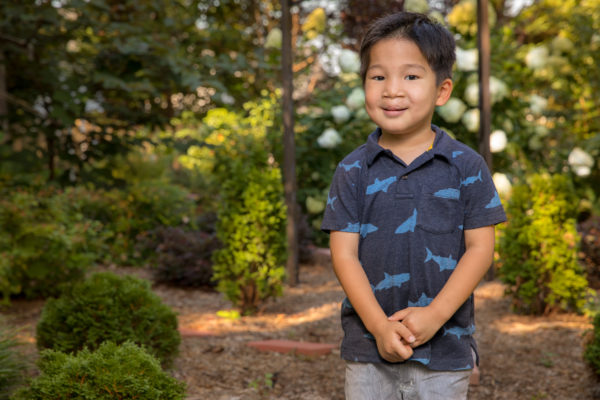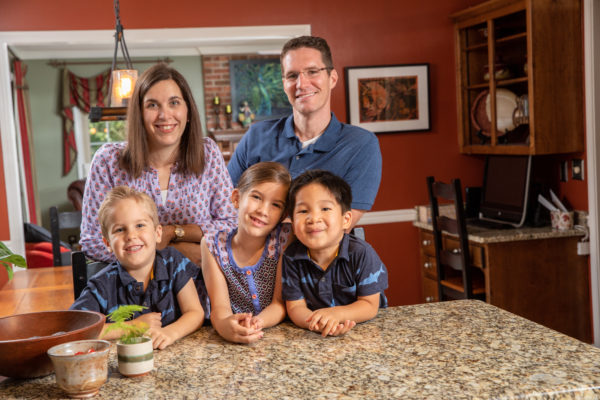My husband and I love talking about adoption. Among our greatest joys is sharing our journey with others and communicating that God uses the most ordinary of people (like us!) to participate in something extraordinary.
I always feel a deep need to impress upon those who are considering the call to adopt that every family’s story looks different. The joys, the fears and the struggles are so individual and couldn’t ever be prescriptive for others. I know of families that have gone through unimaginable pain and trauma with their adoption journey. And I’ve known families who’ve experienced unbelievable joy and bonding. It is my prayer that as families share our stories this month, that prospective adoptive families will gain a realistic picture of the potential struggles with craniofacial needs, but will recognize the amazing joys and delights, especially as they relate to the journey to communicate.
Years ago I sat down with a doctor friend to obtain counsel as to what special needs our family was equipped to handle. We don’t live in a big city with renowned surgeons, and we really didn’t have a strong sense of calling to a particular “need.” At that point, we indicated on our form that we would consider a child with craniofacial abnormalities.
A lot of time passed. Our adoption journey was unusual (another long story), so after obtaining our LID in 2008, it would be another eight years before we were matched with a little boy and traveled to China. During that interim, God gave us two biological children, as well as a lot of other family changes. I quit my full-time job, and my husband began a second part-time job in addition to his full-time university teaching position.
Fast forward to March 2016. At that time, after a lot of uncertainties, our agency sent us a couple of files to consider, and we matched with a little 18-month-old boy who had a repaired cleft lip, and an unrepaired cleft palate. In our decision-making, I can honestly say that his special need never caused us much anxiety.
I was very naïve at that point. I assumed that cleft care was pretty straightforward, although I did enough reading to know that there could be some challenges, depending on the child. We thought we were mentally prepared for the journey to surgery and the years of speech therapy that would be ahead of us. Our last update before we left for China showed that our son was very healthy and robust – a far cry from his 9-month-old referral photo.
When I met Asher, a month and a half before his second birthday, he was basically non-verbal. That’s what his file had indicated, and that’s what I found to be true. He did make noises, and I was constantly asking our guide if she recognized them to be approximations of Chinese words. She couldn’t recognize any of his sounds.
He had no problems eating during our weeks in China, although his paperwork had indicated that he was primarily on bottles. He also did not need the special cleft bottle that I had brought along. I had also brought a specific sippy cup that a fellow cleft adoptive mom had suggested, so we worked hard on that from the beginning, and he eventually was able to drink water easily from it by the time we left for the USA.
As soon as we got home, I started all the rounds of appointments with his pediatrician, ENT, and palate surgeon and began the application process for early intervention therapy, including speech therapy. We are blessed to have a surgeon in our city who specializes in pediatric facial surgery, but since he is the only one, we had to wait to see him. And, after that initial consult, there was another long wait for surgery. I wasn’t worried about that – from everything I had read it was not a bad idea to have plenty of bonding time before going into major surgery.
Asher’s ears were pretty typical for a little boy born with an open palate. His hearing tests came back indicating that he needed intervention, so our ENT (a fellow adoptive China dad!) put in ear tubes which had an almost immediate effect.
What delighted us the most was that upon coming home, Asher almost immediately began to try to speak. Although there were many sounds that he could not produce, the point was that he was trying. We were thrilled to find a speech therapist whose specialty was working with cleft kids, and she began working with him verbally and with sign language just as soon as we could get the paperwork approved. Even though he would ultimately not have his palate surgery until nine months after coming home, he made consistent progress with his speech therapist in the interim.

Surgery was a challenge – as I’m sure it always is. Asher was an avid ambidextrous thumb sucker, so for our 2-year-old to wake up with arm restraints was extremely traumatic. However, after that first rough week, he healed amazingly well. He ate his soft diet without too much protest. Favorites were a porridge made of ground up cheerios with milk and chicken broth, quinoa, and cooked broccoli pulverized in our blender. And he never went back to thumb sucking.
As we entered this new life of doctors and therapies, I began to deepen in my understanding of the challenges connected to this special need. When I was in China, I remember feeling almost embarrassed that Asher even was considered to have a special need. The other families in my travel group were adopting children with profound special needs – Down syndrome, blindness and profound hearing loss. However, once we came home, I began to understand that communication struggles could be much more profound than I had imagined.
In the Lord’s providence, Asher himself has not experienced a great deal of struggle. Everything has certainly taken time – and he has not always gracefully submitted to the multiple surgeries, procedures, and therapies. However, as I’ve read more about the cleft community and built friendships with other families, I began to understand that there is often no straightforward path to communication and healing.
While Asher has made steady progress with his speech and has not required additional palate surgeries, I began to meet families whose children had experienced myriad surgeries due to fissures and failed bone grafts. Our dearest adoptive friends have experienced the complications of multiple p-flap surgeries and sleep apnea.
We’ve learned to not take the road to communication for granted.

The biggest key to Asher’s progress has definitely been the amazing speech therapists that have poured their lives into him. He will have been home three years this September, and the three women that have worked with him have persevered through toddler willfulness, inattention and just plain orneriness. I will forever be grateful to them and to the Lord for giving him the gift of communication.
As Asher gets ready to turn five this fall, and we begin to think ahead to school, I am encouraged that God will continue to provide the people he needs on this journey.
I know that as Asher matures, he’ll face new challenges – his bone graft, extensive orthodontic work, decisions about cosmetic lip revisions and scarring, as well as dealing with the grief that adoptive children face. One of the things we are trying to do as a family is provide him with friendships with other adoptive children so that as he grows, he will have friends with whom to relate and share.
We cannot imagine our life without our precious boy. He delights us and continues to teach us what love looks like.
We will never take for granted the priceless gift of communication.
– guest post by Anne

























Leave a Reply